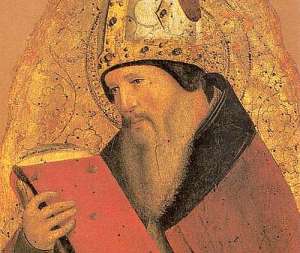Predestination and Freewill: Augustine and Pelagius
St. Augustine of Hippo took a different approach to the Pauline understanding of the relationship of the human will to salvation. Augustine understood Pelagius to attribute too little to God in the salvation process: “It becomes clear that the grace Pelagius acknowledges is God’s showing and revealing what we ought to do, not his giving and helping us to do it.”[4] For Augustine, the human will, empowered and sustained by the grace of God, wills toward salvation, though only in part. For, “Who does not realize that a person comes or does not come by his free choice? If he does not come, then free choice acted alone. If he comes, however, then it must have been helped, and helped not only to what to do but to do what it knows. Thus when God teaches through the grace of the Spirit rather than the letter of the law, the result of his teaching is not simply that a person is aware of what he has learned by knowing but also that he seeks it by willing and accomplishes by acting. This divine way of teaching assists not only the natural capacity for willing and working but also the actual willing and working itself.”[5] The grace of God held primary importance for Augustine’s soteriology, as without it nothing could be accomplished.[6] Augustine affirms the understanding of Ambrose of Milan concerning the relationship between God and human will, that “the Lord also cooperates with our wills”[7] and that ultimately God remains sovereign over all human action.[8] Thus for Augustine, “Free choice is adequate for evil, but it can manage good only if it is helped by Sovereign Good”[9], and thus the human will on its own remains not able to not sin.[10]
Augustine also gave a number of other considerations concerning the understanding of the human will and salvation. Of great importance in understanding Luther’s interpretation of the Romans, Augustine laid the foundation for a strong dichotomy of law and grace in interpreting Paul. Quoting Romans 7:7, Augustine writes that, “Thus the law and grace are so different that the law is not only useless but actually an obstacle in many ways unless grace assists. This shows, moreover, the function of the law: it makes people guilty of transgressions and forces them to take refuge in grace in order to be liberated and helped to overcome evil desires. It commands more than it helps; it diagnoses illness but does not cure.”[11] Using his three-part model of capacity, will, and action to describe the relationship of the human will to salvation, Augustine writes that “God not only helps the capacity even if a person neither wills nor acts well, but also helps willing and action itself, so that a person wills and works well…. Let him [Pelagius] admit that this is the grace of God in our Lord Jesus Christ, through which he makes us righteous by his justice rather than our own, that our justice is that which comes from him.”[12] These understandings will become important in viewing Luther and Erasmus’ use of Romans and their constructions concerning the human will, as both Erasmus and, especially, Luther believe that they are interpreting Augustine’s interpretation of Paul with regard to soteriology correctly.
[1] Pelagius. “Letter to Demetrius.” Translated and Edited by J. Patout Burns. Sources of Early Christian Though: Theological Anthropology. Series Editor William G, Rusch. Fortress Press: Philadelphia, 1981. 49. [2] Ibid., 50. [3] Ibid., 43. [4] Augustine of Hippo. ”On the Grace of Christ.” Translated and Edited by J. Patout Burns. Sources of Early Christian Thought: Theological Anthropology. Series Editor William G. Rusch. Fortress Press: Minneapolis, 1981. 67. [5] Ibid., 72. [6] Ibid., 82. [7] Ibid., 91. [8] Ibid., 93. [9] Augustine of Hippo. “On Rebuke and Grace.” Translated and Edited by J. Patout Burns. Sources of Early Christian Thought: Theological Anthropology. Series Editor William G. Rusch. Fortress Press: Minneapolis, 1981. 101. [10] Ibid., 100-101. [11] Augustine of Hippo. ”On the Grace of Christ.” Translated and Edited by J. Patout Burns. Sources of Early Christian Thought: Theological Anthropology. Series Editor William G. Rusch. Fortress Press: Minneapolis, 1981. 67. [12] Ibid., 94.

No comments:
Post a Comment